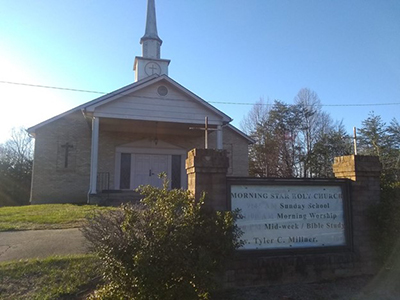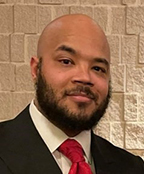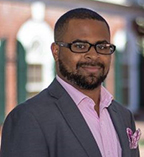
The pandemic was a blow to all places of worship. For Black churches in particular, it was the most recent development in a decades-long trend.
By Dean-Paul Stephens
(Source Cardinal News):

As churches, mosques and other houses of worship closed their doors, the Rev. Matthew Brown and the other leaders of St. Paul High Street Baptist Church in Martinsville did what was best for their aging congregation, even though it might not have necessarily been in the best interest of the church’s future.
It was a decision Brown knew he would eventually have to make, even before he temporarily closed his church’s doors.
“COVID certainly changed the dynamics of churches,” Brown said.
It was a time when information was scarce and his capacity to provide guidance was limited as he witnessed members of his congregation die.
Months after restarting in-person worship, his church and others are doing the work to get back on their feet.
“Pre-pandemic, on a given Sunday we had between 100 and 125 members,” Brown said, adding that that number is now around 75.

Brown said the pandemic was a blow to all places of worship. For Black churches in particular, it was just the most recent development in a decades-long trend.
It’s a well-documented phenomenon, according to Jason Evans, a doctoral candidate in Christian theology and African American religion at the University of Virginia.
“It’s been going on for a good 60 years,” Evans said.
One of many scholars tracking religious trends, Evans echoes his contemporaries in the widely held consensus: Church participation is dwindling.
“The African American congregation is declining,” Evans said, citing a study by the Pew Research Center, “Faith Among Black Americans.”
Published in 2021, it is one of a small handful of studies that center on the African American church. Evans said that while there is a dearth of information concerning Black congregants, what little data is available echoes what’s been put forth by more mainstream studies that typically focus on the church in its entirety or on White evangelical congregations specifically.
In 2021, Gallup researchers published a report that gauged church participation across all race and denominational spectrums. They found that while COVID-19 had dampening effects on church-related participation, the pandemic only exacerbated an already entrenched problem.
Perhaps one of the report’s most important revelations was the discovery that around 47% of American adults were affiliated with a church, down from 73% when the same poll was taken in 1940.
That number continued an overall downward trend, with the exception of 1990 to 2000, which showed a slight uptick. Church participation figures from 2020 are not only the lowest they have ever been, but that year marked the first time in the nation’s history that church affiliation dropped below the 50% mark.
Pew’s study showed that the African American church has been somewhat resistant but not immune to the trend of shrinking congregations. According to Evans, this is a function of the Black church serving multiple roles within its community.
“Out of those churches they founded institutions of education,” Evans said. “They also founded food pantries, clothing ministries, et cetera. So there is this social agency with the Black church. They have been essential places for political organizing. They have positioned themselves to where people, whether religious or not, can get a social good from them.”
According to Pew’s study, 1 in 5, or 21%, of African Americans self-identify as atheist or agnostic, a figure that increases among younger generations. Roughly 33% of millennials and 28% of Gen Z identify as atheist or agnostic, compared to 11% and 5%, respectively, of Black baby boomers and Silent Generation members.
Church affiliation, according to Evans, is one of the more obvious methods of gauging a church or group of churches. While individual churches, such as those located in or near growing cities, may experience participation upticks, they have little bearing on the overall picture painted by national trends.
While African American churches have always enjoyed a lofty status among their respective communities, they, too, have suffered from diminishing returns with each passing generation.
“I would say, for me, I’ve seen a little bit of a decline,” said the Rev. Douglas Bynum of Mount Zion AME in Martinsville.
In this regard the Black church serves as a sort of canary in the coal mine for churches of all races and denominations.
A begrudging consensus
It’s a reality that church leaders aren’t too keen to admit. A group of pastors who represent predominantly Black congregations in Martinsville and Henry County, as well as in other places in Virginia and a number of states in the Southeast, all offer anecdotes about the trend, some blaming the pandemic while others saying the issue predates it.
“The reality is all churches of the mainline Protestant denomination, for several years pre-pandemic and post-pandemic, have taken a dip in growth,” said the Rev. James Davis, who presides over churches in Virginia, North Carolina, Georgia, Maryland and the District of Columbia. “We find ourselves in a struggle to explain our theology.”
The Rev. Tyler Millner of Morning Star Holy Church in Martinsville said the issue is twofold, with pastors having to contend with diminishing congregations as well as struggling to attract new followers. Although he says he hasn’t noticed a significant dip in Sunday participation, he said growing his church has proven difficult.
“It is a challenge,” Millner said, adding that people are learning to express their personal spirituality without a house of worship. “The pandemic has magnified that to a degree, you don’t need a church to be spiritual.”
These experiences, according to Evans, not only coincide with research findings, they are the result of a myriad of factors.
“African American religious adherence, specifically within Protestant churches, tends to be older folks,” Evans said, specifying an age range of 45 years and older. “The older people in these churches are dying off. There is also a decline, over time, in membership of Black millennials and Gen Z-ers.”
Diminishing generational returns
Pew’s study characterizes sentiments among younger African Americans.
“The survey of more than 8,600 Black adults (ages 18 and older) across the United States finds that young Black adults are less religious and less engaged in Black churches than older generations,” reads an excerpt from Pew’s study.
“Black Millennials and members of Generation Z are less likely to rely on prayer, less likely to have grown up in Black churches and less likely to say religion is an important part of their lives. Fewer attend religious services, and those who do attend are less likely to go to a predominantly Black congregation.”
Evans describes the relationship between the church and younger generations as “loose,” adding that, unlike older generations, many were not directly raised to be religious.
“Some who were raised to be religious no longer attend a church for myriad reasons,” Evans said. “Some might not find religion of any particular value to them, others disagree with the teachings of their religious traditions.”
Davis and other Black pastors agree with Evans’ characterization, while adding that popular culture itself has made the message less resonant.
“Their view of the world is different and young folks are more goal-oriented,” Davis said. “I think this new market of religion is not as grounded in theology as it is grounded in action right now.”
The church and social justice
“I think it’s a fact that social justice and social justice issues have always attracted people who are concerned with their environments and their communities,” Davis said, adding that the Black church has always been a significant driver of social justice in the United States. “That hasn’t changed throughout the ages.”
Pew’s study places an emphasis on social justice, saying “there is a broad consensus among Black Americans of all faiths that predominantly Black churches have played a valuable role in the struggle for racial equality in U.S. society.”
The study also found that three-quarters of polled respondents agree that the Black church played a role in social justice movements. Pew’s report suggests that Black churches should be preserved because of their role in equal rights movements, and pastors such as Davis believe social justice can be a vehicle to endear the church to younger congregants.
Millner said the Black church has been lacking in this aspect over recent decades.
“There just isn’t as much energy in outreach and social justice,” Millner said, adding that deemphasizing social justice work is inexcusable.
While Davis agrees, he warns that there are differences between activists of the original civil rights movement and their more contemporary counterparts.
“The difference is this: I think that Grandma and Great-Grandma had a theological grounding that had a dependency on God in this process of social justice,” Davis said. “When they were marching, it was a God force. While they were protesting, there was God’s protection. What has happened, in this new movement, they don’t see God in that. They see social justice, they see it in light of their own strength.”
A silver lining
Davis believes that going forward Black churches must become indispensable to various social justice movements, particularly to attract younger congregants.
His contemporaries believe that traditional churches must update their conception of spirituality, one that isn’t necessarily tethered to a house of worship. Davis said the pandemic forced many pastors to do just that when they turned to livestreaming their Sunday services.
“Most of the Black churches have not experienced the necessity of it because it always relied on the necessity of the church going to it rather than it going to the people,” Davis said. “The idea of Zooming, the idea of using social media to its fullest, technology created a whole new path to getting the church to the people.”
It’s a solution Davis and others believe has utility outside of pandemic conditions. During a recent Sunday service, Millner spoke before his congregants while a small camera atop a tripod offered an option to those not willing or able to brave the morning’s cold and snow.
“We have to be much more sophisticated in several ways,” Millner said.
Evans said those churches that adapt to an environment of decentralization will survive in the coming decades. He envisions a scenario in which affiliation with places of worship isn’t necessarily driven by secularism.


Be the first to comment